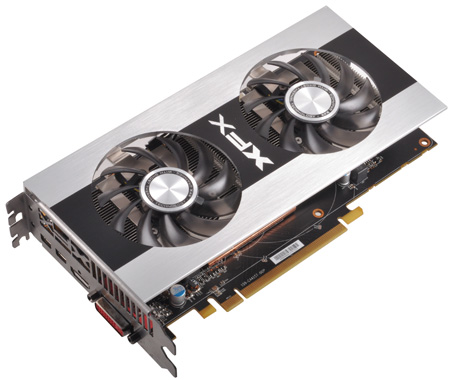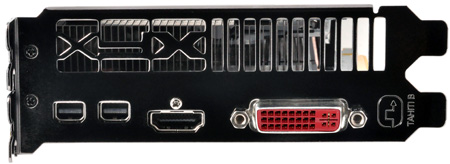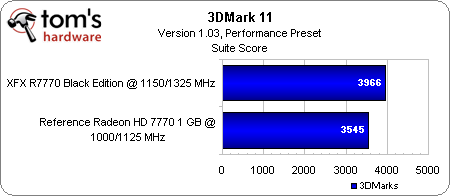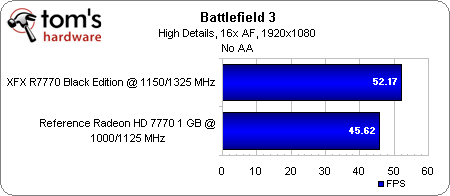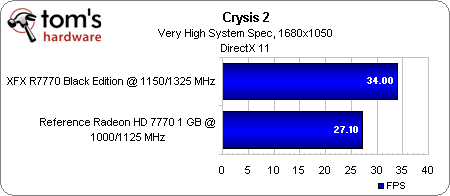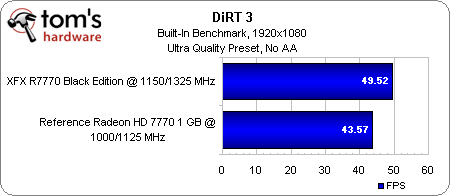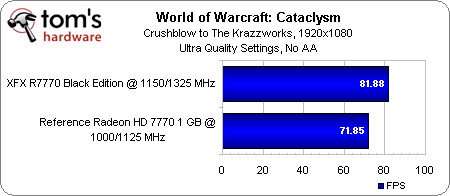AMD Radeon HD 7770 And 7750 Review: Familiar Speed, Less Power
These are the lowest-end cards built using AMD's new Graphics Core Next architecture. Is 28 nm manufacturing, a fresh design, and new functionality enough to warrant upgrading existing value-oriented champs like the Radeon HD 6850 and GeForce GTX 460?
Overclocking With XFX’s R7770 Black Edition Overclocked
A great many board partners will be selling Radeon HD 7770 and 7750 cards at launch, according to AMD. One of those vendors, XFX, sent us its flagship Cape Verde-based card, the R7770 Black Edition Overclocked.
A number of distinctions separate XFX’s card from AMD’s reference board. Aftermarket cooling is perhaps the most obvious. The R7770 Black Edition Overclocked employs a pair of axial fans spinning over aluminum fins attached to a copper heat sink. At idle, the combination is as close to silent as you can get. Under a 10-loop Metro 2033 load test, I measured 37.4 dB(A) from one meter away—quieter than some other cards’ idle acoustic output.
Of course, as its name suggests, the card ships overclocked, too. A 1120 MHz core and 1300 MHz memory setting are fairly significant increases over AMD’s own design. And those frequencies are made more notable by the fact that they don’t negatively impact thermals. Even as the card generates minimal sound, core temperatures hover one degree lower than the reference board.
XFX claims that such a seemingly-impossible combination of less noise, less heat, and more performance is made possible through a process called GPU edging, whereby the top 1% of GPUs are set aside based on their ability to overclock without pushing higher power levels.
Capitalizing on XFX’s binning process, we pushed the card even further and found stability with a 1150 MHz core and 1325 MHz memory clock.
At its highest overclock, the R7770 Black Edition is nearly able to match a GeForce GTX 560. We’ll have to see what sort of premium XFX charges for its most highly-tuned card. But there’s not much room above AMD’s $160 suggested price before bumping into the $185 or $190 most GTX 560s currently sell for.
Get Tom's Hardware's best news and in-depth reviews, straight to your inbox.
Current page: Overclocking With XFX’s R7770 Black Edition Overclocked
Prev Page Meet Radeon HD 7770 And 7750 Next Page Flexible Form Factors And Tessellation Performance-
Derbixrace the 7750 will be a GREAT card compared to the 6670 for those who have a shitty 300w PSU and wants a nice GPU.Reply -
phamhlam If the 7770 is the same price as the 6850. I think we have the best value card right here. The 6850 was a great budget card but this card will change that.Reply -
dragonsqrrl "Although other cards beat it in encryption and decryption performance, the Radeon HD 7750 easily secures a second-place finish in the SHA256 hashing test."Reply
I think you mean AES256. -
jprahman The fight shaping up between all these new AMD cards and Kepler is looking to be a good one. Time to just sit back with some popcorn and enjoy the show... while planning a new build for when the price war breaks out.Reply -
esrever Seems ok, New stuff ussually cost more. The 6770 being more expensive than the 5770, the 6870 being more expensive than the 5850 ect.Reply
I'd expect prices to go down once supply goes up and demand goes down. -
confish21 What a sad release. I'm not even excited for Pitcairn now! I foresee the $170 6870 to hold its own.Reply -
This is ridiculous. Man this sucks, i've been waiting for the 7770 since early last year, and this crap is what they release?Reply
What_were_they_thinking? -
wicketr Well....here's hoping for a good 7850/7870 release on March 6th. Not much here worth spending money on IMO.Reply -
buzznut This is unfortunate, considering the naming scheme. The 4770, 5770, and 6770 were/are all good budget cards that performed above where they were priced. Bang for buck has always been the draw here, but that 7770 is overpriced. Hopefully AMD will see this fumble; I agree at $120-130 this card makes a lot more sense.Reply
I'd actually like to see the HD 7750 at a lower price too, as we know these prices will drop over time but I still think this is slightly high for launch.
